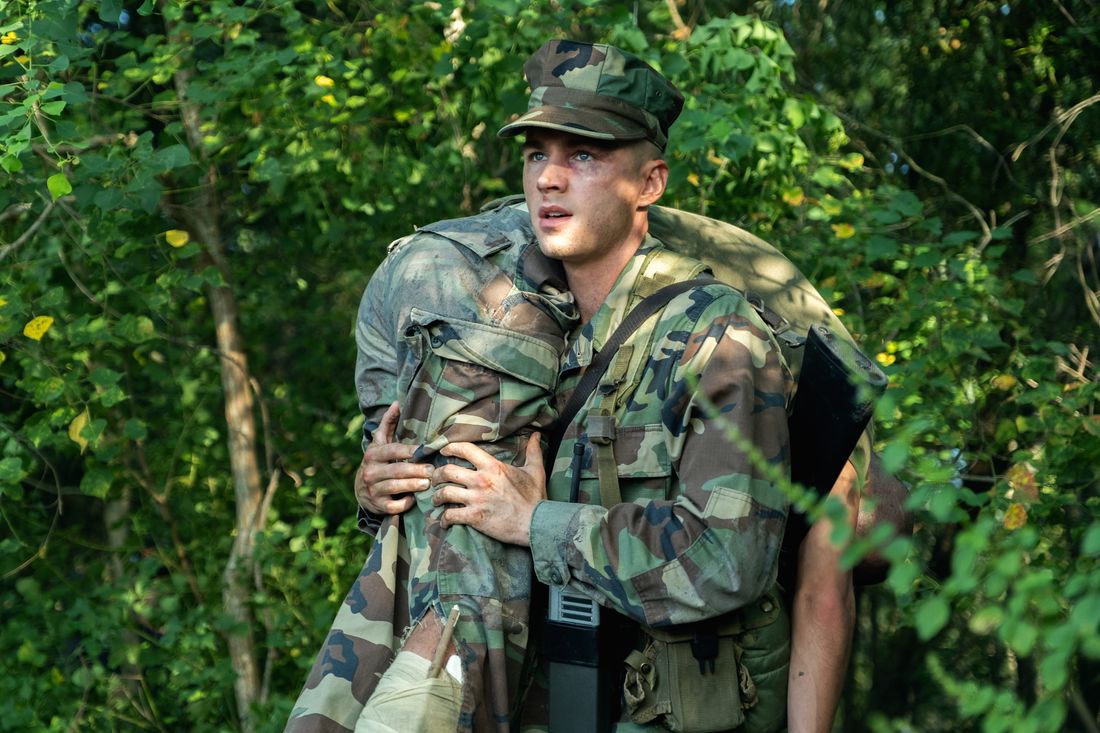
Spoilers for all eight episodes of Boots on Netflix.
The series *Boots* realistically portrays the intense process of joining the Marines, focusing on an 18-year-old who enlists before the implementation of “Don’t Ask, Don’t Tell.” Adapted from Greg Cope White’s memoir, *The Pink Marine*, the show follows a young man (played by Miles Heizer, known for his teen roles) who spontaneously joins basic training with the friend he has a crush on. *Boots* feels like a comedic take on summer camp – our main character endures tough drills, forms close bonds with his fellow recruits, and learns to persevere. The show suggests that the harshness of military training can actually improve a person, which is a bold claim. I kept watching hoping the series would challenge this idea, but after finishing the season, I’m still unsure if it does.
The show *Boots* avoids typical coming-out storylines, which is a good thing. The main character, Cameron “Cope,” already knows he’s gay, but the writing makes him surprisingly naive about what being gay in the Marines will be like. The show relies heavily on explaining things, likely because it wants to make sure viewers understand the political climate of the early 1990s. For example, when Cope thinks about joining the military, he asks a friend if it was *illegal* to be *gay* in the *military*, and his friend simply replies, “Yeah, it’s messed up.” The show then depicts Cope going through basic training, where he faces challenges and prejudice from other recruits (and the show doesn’t shy away from using offensive language). Cope deals with his feelings by imagining conversations with a more sarcastic version of himself, but as he gets better at training, he starts fantasizing about being a hyper-masculine action hero. The show seems to suggest this is what a “real” man looks like.
The series introduces Sergeant Sullivan (Max Parker), an older Marine who’s trying to conceal his history, and presents a more realistic portrayal of a man grappling with his identity. While flashbacks reveal a past romance in Guam, Sullivan, like Cope, finds meaning in his service, and is more upset by a potential rule violation than by flaws within the system itself. I found myself urging the characters to leave and pursue other opportunities – “get out of there!” Cope becomes infatuated with a new recruit, Jones (Jack Cameron Kay), who seems unsure about being a Marine and has a distinctly unconventional look. However, the show frames Jones as a distraction from the core mission of becoming a good soldier. Their flirtation never goes further, and Sergeant Sullivan creates tension between them with a physical challenge. Sullivan appears subtly envious of Jones, hinting at a powerfully charged, yet underdeveloped, dynamic between the two.
The show *Boots* avoids depicting actual sexual encounters despite hinting at attraction and desire. While it features plenty of attractive men and suggestive scenes, the characters never follow through, creating a strangely repressed atmosphere. It’s as if the show wants to showcase the aesthetic without exploring the reality of what relationships – even casual ones – might have been like, particularly considering the time period. The show makes playful references to the campy aspects of military life, but avoids addressing the larger historical context, such as the fear surrounding AIDS in the 1990s and the Pentagon’s controversial response to the epidemic within the military. This history, which included initially imprisoning infected soldiers and later implementing policies around confidentiality, is completely absent. Ultimately, *Boots* seems more focused on its soundtrack than on authentically portraying life in 1990.
The show attempts to add nuance to its ideas about what it means to be a man, reflecting current liberal viewpoints: it suggests vulnerability can be a strength, and that anyone can find their own path, regardless of body type. A shocking moment occurs when a trainee dies from pushing himself too far, but the overall message remains focused on making small changes within existing structures. While *Boots* acknowledges different ways to express strength and masculinity, it never questions the fundamental concept of masculinity itself. The series also actively deflects criticism of the military. For example, one Black recruit explains that, despite his parents’ concerns about the military as an oppressive force, he prefers to work for change from within, viewing military service as a valuable asset for a future political career. The show essentially suggests striving within the system before attempting to dismantle it.
The show *Boots* tries to portray military service as ultimately worthwhile, despite acknowledging some problematic individuals. While military training might benefit some, the show feels overly simplistic and avoids any real criticism, coming across as promotional material. The Pentagon’s negative reaction – calling it “woke garbage” – highlights the futility of trying to appease those unwilling to accept inclusivity. The show focuses on the physical burdens soldiers carry, but largely ignores the psychological trauma of combat or the broader consequences of U.S. military actions, treating it more like a challenging competition than a powerful, globally impactful institution. It wasn’t until the very end of the season that a character even learned about the war in Iraq, setting the stage for a second season supposedly taking place in the Persian Gulf!
Read More
- Movie Games responds to DDS creator’s claims with $1.2M fine, saying they aren’t valid
- The MCU’s Mandarin Twist, Explained
- All Golden Ball Locations in Yakuza Kiwami 3 & Dark Ties
- These are the 25 best PlayStation 5 games
- SHIB PREDICTION. SHIB cryptocurrency
- Scream 7 Will Officially Bring Back 5 Major Actors from the First Movie
- Server and login issues in Escape from Tarkov (EfT). Error 213, 418 or “there is no game with name eft” are common. Developers are working on the fix
- Rob Reiner’s Son Officially Charged With First Degree Murder
- MNT PREDICTION. MNT cryptocurrency
- Every Death In The Night Agent Season 3 Explained
2025-10-18 01:57